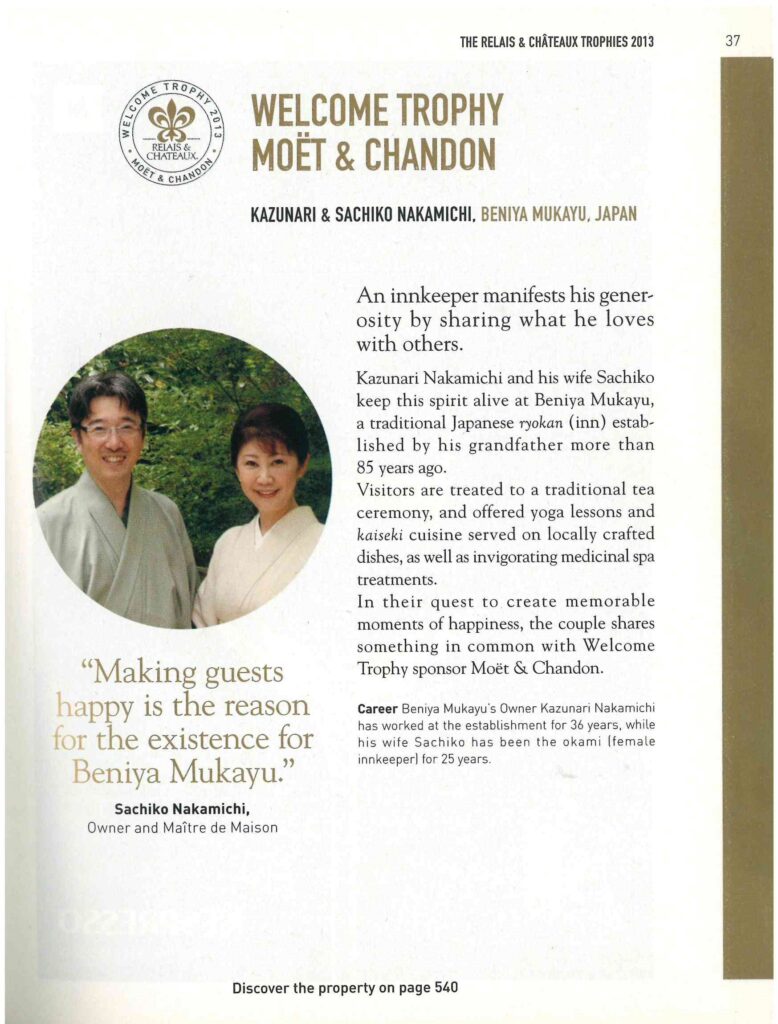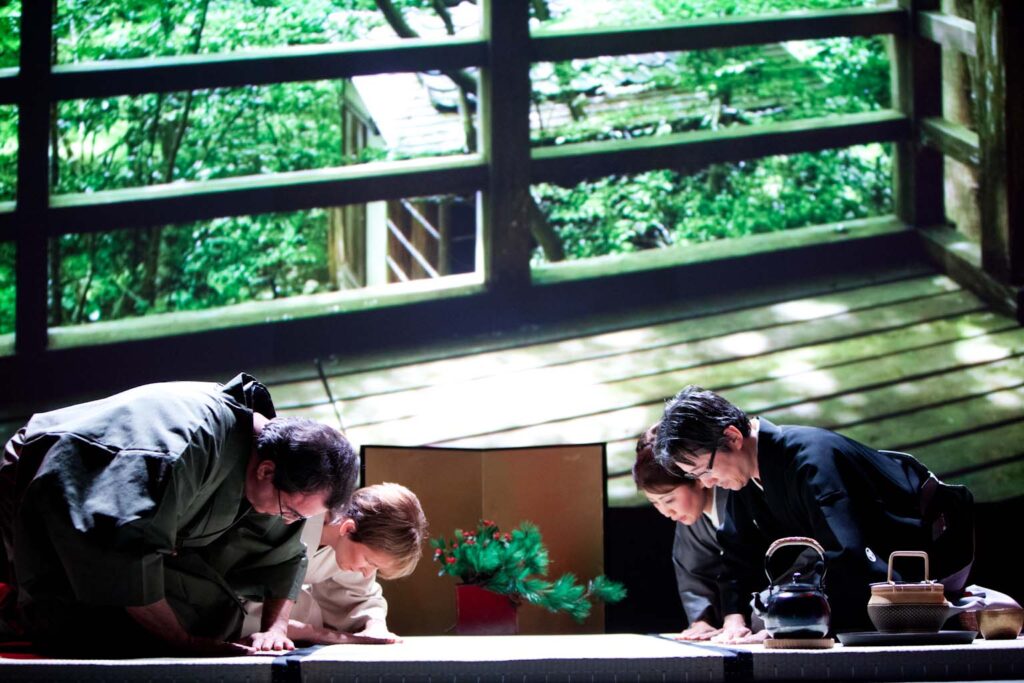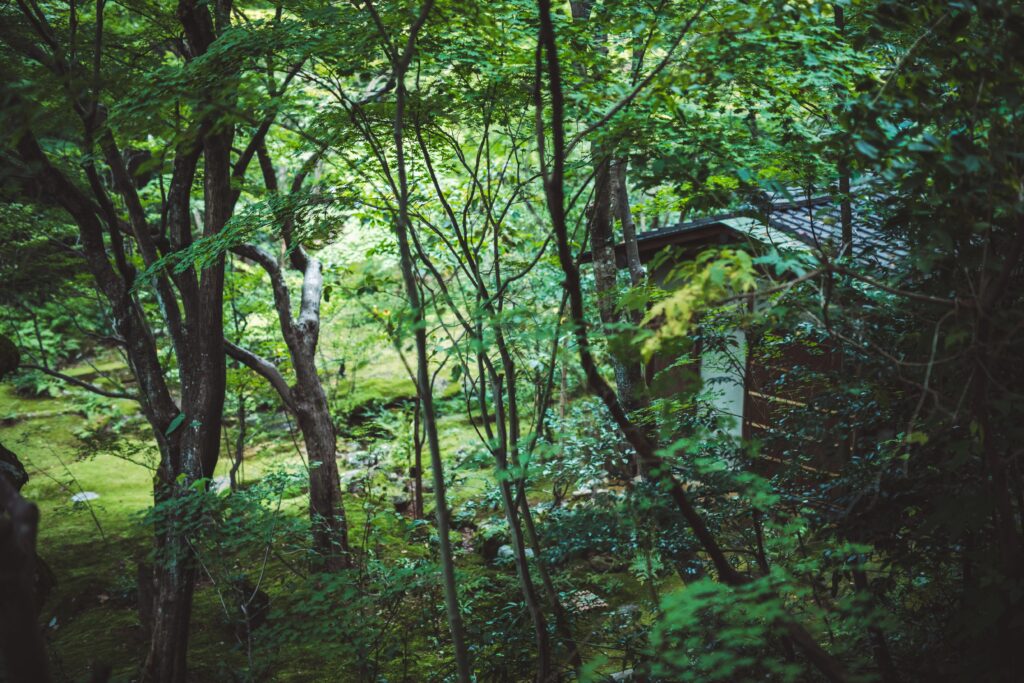4.5 Special experiences of silence: the extraordinary and the ordinary
Sachiko: Let me give you another example of a special experience of silence connected to the tea ceremony. In 2013, Beniya Mukayu has been awarded the Welcome trophy of Relais & Châteaux, so Kazunari and I have performed the tea ceremony at the Relais & Châteaux annual congress, as a symbol of our hospitality. That year, the congress was held in Turin, Italy, and the ceremony was to be performed in Carignano Theatre, Turin Opera house, a huge theatre filled with all Relais & Châteaux members.

Before the annual congress, Kazunari and I had discussed with the French and Italian organizers about the stage settings and background music via email. We wrote that we did not want any background music because formal tea ceremony is “filled with silence”. The organizers were surprised and could not understand it at first – they hadn’t been to Japan and hadn’t experienced a tea ceremony – so they somehow insisted that the performance on the stage to be accompanied by flowery music, but finally they accepted our request even if to them having no music was almost unbelievable. You know, the performances at Relais & Châteaux annual congress are very gorgeous, there is always music on the stage…
Kazunari prepared the tea, I did the assistant, and the president and the vice president (at that time Tapies and Loiseau respectively) joined as the guests, wearing kimono. They performed their role very well, even if it was their first time! We were four people on the stage. As the performance proceeded in silence, we were very surprised, nobody spoke. It was very quiet. Carignano Theatre, a very big opera house, was filled with more than five hundred silent people… They were all Relais & Châteaux owners and representatives from all over the world, having different cultures, but all of them were very quiet. And they enjoyed the silence, I thought. During the performance of tea ceremony, the silence in the theatre was impressive: five hundred silent people watched our gestures, they were all very quiet… It seemed that the silence had deepened their appreciation. At the end of the tea ceremony, Kazunari and I and the two other guests bowed in silence. When we raised after the final bow, everybody applauded: that sound made me realise that we had been able to share the silence, the Japanese silence in Italy with the members and representatives of Relais & Châteaux from all over the world. The great applause that followed the silence was so touching! I will remember it forever.

Scott: That is wonderful. Because in the silence we connect with one another, you know what I mean?
Sachiko: Silence connects everybody.
Scott: You know when you go to a sporting event in the United States like a basketball game, if someone famous died, they will say: “And now, ladies and gentlemen, a moment of silence or so and so”, and suddenly you have 16.000 people together and you hear nothing, it’s so powerful, so beautiful… so what you are describing is a very powerful thing. You were lucky to have that experience.
Sachiko: I still am so happy! Scott, do you have any special experiences of silence?
Scott: Every day. I love it. Most of the activities I engage in are nonverbal: writing, reading, cooking, running, walking my dog, listening to instrumental jazz. You know one of the things that really interests and surprises people from the States when they come to Japan, is how quiet it is, I don’t mean the Tokyo districts or neighborhoods of Shinjuku, Shibuya, or Ginza. I mean: you are on a train, you are on a subway, you are on a sidewalk, you are even in a café, it is not noisy and people are very surprised by this. I must say two things, one is that when I return from Japan it seems so noisy in the States, really noisy, and I don’t like it. I believe that lot of my appreciation for these daily things come from being in Japan, so that I really value silence much more since my experiences in Japan going back so many years. I just like how quiet, how powerful silence can be if you do it every day, it’s really powerful. You can think, you know what I mean, and you can connect. Today, I was walking my dog and it was so quiet and I saw the two birds, and I heard the two birds: they were singing, they were very excited because spring is here and I think they are in love and they were celebrating something, there was something special they were paying attention. So, if I was on my cellphone or if I was talking to someone when I was walking I wouldn’t have heard that. But it was just me and my dog and my dog, as we know, doesn’t talk. If you are quiet it is amazing what you can observe and Japanese do it every day.
People ask me: “Is Japan religious” and I say: “No, it’s not religious, it’s more… it’s a spiritual place.” If you go to a garden in Kyoto, a Zen temple garden, nobody would dream of making noise, it’s just so quiet, it’s so quiet. And it just calms you down. You know, as I think about these little things, it really becomes clear how valuable it has felt to me to learn about Japan, to be here, and then to take these experiences back with me as my souvenirs.

Sachiko: Your souvenirs!
Scott: When I first came to Japan, one of the first things that surprised me was when I would go to bars or cafés and they would play old jazz of the 1950’s: Miles Davis, John Coltrane, Bud Powell, you don’t hear that in the States and that kind of music is so full of silence, it’s almost a music of silence in a way, it is very powerful. It’s not a lot of noise, there is no singing, it’s just very peaceful in a way. So this business of mine listening to jazz, a lot came from being in Japan.





